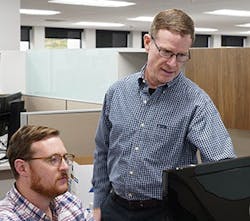For much of my career, I was the stereotypical young, up-and-coming high-potential employee. I worked hard, positioned myself to learn new aspects of my craft, and relocated my family numerous times in an effort to prepare myself for “the next move” in my career. Now that I am in my 50s, I realize I am no longer young, and it really hurts to put that in print. In addition, like anyone else at my level, I am no longer a “high-potential” employee, as with each move up the corporate ladder my potential went down. I’ve mentioned several of the things I did to give myself the best possible chance to succeed, but the most important was what I learned from those around me.
Those who mentor others typically enjoy the experience and find it rewarding. Photo: Motion Industries
It’s important to be open to learning from those who have moved up the ladder before you. Learning from your own mistakes teaches valuable lessons, but too many mistakes can take a toll on your career in the long run. Take the time to learn from each of your leaders as you change jobs. Do not just learn what they want you to do in your position but why they want you to do it. When you start asking a leader “why,” the leader will typically open up and give you an example from his or her professional journey about a lesson learned. This works for you in two ways; first, you get to learn from the mistakes the leader made early in his or her career, which does not negatively affect you or your career at all. Second, it helps you form a deeper relationship with your leader – one that is founded on respect. It is a leader’s responsibility to help employees become as successful as possible. In most cases, leaders also enjoy passing along what they have learned in their careers. I am thankful for the help I received throughout my career. I am the sum total of the effort I put forth in my work and what I learned from those around me. I still find myself quoting leaders I have not been around since my 20s.
Do not limit your search for this information to your direct superiors. Search out subject-matter experts in related areas of your field for mentoring opportunities or special projects to develop your skills. For example, for most of my career I was a human resources generalist, which meant I was a jack-of-all-trades but master of none. Each year I sought out subject-matter experts in various HR fields such as compensation, talent acquisition, talent management, and labor relations to learn more about their particular areas. I incorporated what I learned through these relationships to make myself a better generalist.
The important thing is that I was not the only one who benefitted from the relationship. Those who mentor others typically enjoy the experience and find it rewarding. Many people late in their career can feel neglected, overlooked, and a little forlorn knowing the end of their career is closer than the beginning. These people have a lifetime of experiences and are often eager to share them. Entering a mentoring relationship often reinvigorates a late-career employee, gives the employee a greater purpose in his or her work, a stronger sense of pride, and an opportunity to learn new ideas from the younger mentee.
So, for the next generation of up-and-coming, high-potential employees in the workforce, I ask you to ask yourselves: When was the last time you tried learning from someone in your organization? If the answer is “never” or “seldom,” determine an area of knowledge you need to bolster and find a mentor, or engage your leader to help you learn. I ask a similar question of mid-career and late-career employees: How long has it been since you spent time developing someone younger than yourself? Much like the answers for the younger employee, if the answer is “never” or “seldom,” I encourage you to step up and give back. The odds are you would not be in the position you are in now if not for a leader early in your career who took the time to teach, develop, or mentor you. Do not let your life lessons go to waste. Pass them along, pay it forward, and make a difference in the lives of others.


